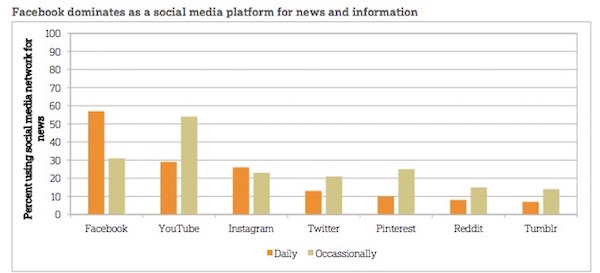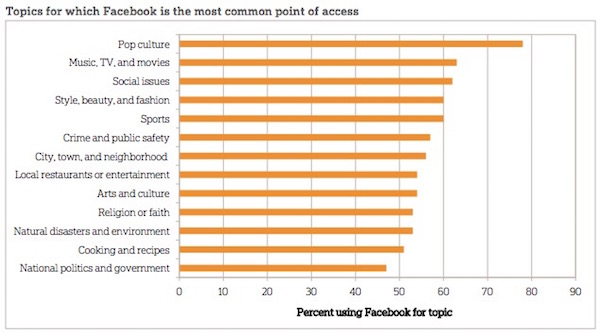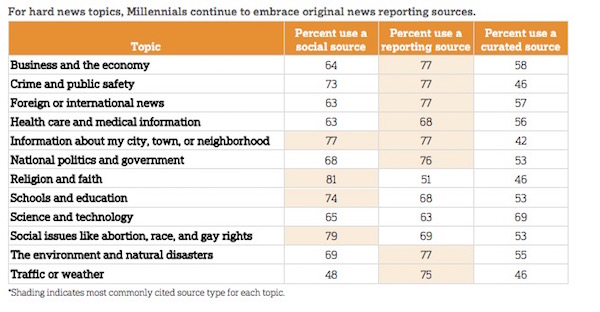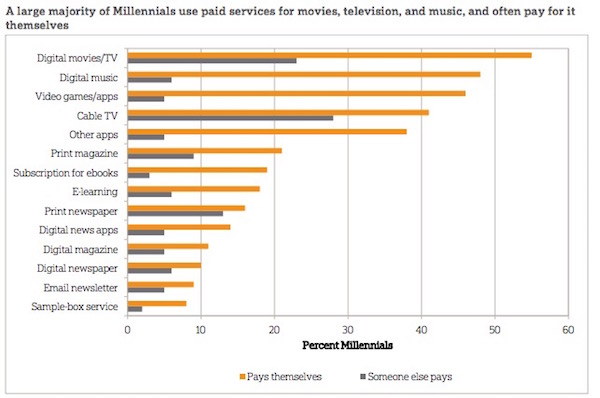
Most millennials don’t seek out news on social media, but the vast majority of them get news from social networks once they see it there, according to a report released today by the Media Insight Project, a collaboration between the American Press Institute and the Associated Press-NORC Center for Public Affairs Research.
Only 47 percent of the millennials surveyed said consuming news is a major reason they visit Facebook, but 88 percent of the respondents said they get news from Facebook at least occasionally. 83 percent said they get news from YouTube on occasion, and 50 percent found news on Instagram. Next in line: Pinterest at 36 percent, Twitter at 33 percent, Reddit at 23 percent, and Tumblr at 21 percent.
“Simply put, social media is no longer simply social,” the report says. “It long ago stopped being just a way to stay in touch with friends. It has become a way of being connected to the world generally — to send messages, follow channels of interest, get news, share news, talk about it, be entertained, stay in touch, and to check in and see what’s new in the world.”
The study found that of those who get news from Facebook, 57 percent do so at least once a day; 44 percent said they did so multiple times per day. That’s a far more regular habit than other social networks induce: The once-a-day number was for 29 percent for YouTube and was 26 percent for Instagram. And Twitter? Just 13 percent of millennials said they use it as a daily source of news.

The report emphasizes that millennials don’t exclusively get their news only from Facebook or other social media. In virtually every news category included in the study, millennials said they have multiple pathways to find information.
The survey asked respondents how they accessed 24 different news topics, from national politics and government to style, beauty, and fashion. Facebook was either the number one or two source of information for 20 of the 24 topics, and in nine of those topics it was the only source cited by a majority of respondents. Search was the second most popular source of information, ranking first or second in 13 of the 24 news topics.

For hard news topics, like economic news or local crime coverage, millennials tended to look directly toward original reported sources for information, as opposed to looking on social media or through curated sources like Google News or other aggregators.

About 75 percent of millennials said they turn primarily to social media for coverage of lifestyle topics. 91 percent of millennials, for example, use social media as a primary source for coverage of pop culture and celebrities. 84 percent of respondents also said social media is a primary source for style, beauty, and fashion topics.

“There are also a few topics for which there is no favored path, or for which people use at least two of them equally,” the study says. “For instance, Millennials have no clear preferred path to news about science and technology. Social, curated, and reporting platforms are cited equally for these topics.”
The study found that millennials of all ages get news from various sources, but that their habits vary. More than half of millennials older than 30 describe themselves as mostly proactive consumers of news; only a third of millennials under 25 say the same. There was broad support for the idea that keeping up with the news had value — 85 percent of millennials surveyed said it was at least somewhat important to them.
Will they pay for news? From the report:
When it comes to paying for the news, 40 percent of Millennials report paying for at least one subscription themselves, including a digital news app (14 percent), a digital magazine (11 percent), a digital subscription to a newspaper (10 percent), or a paid email newsletter (9 percent). When subscriptions used but paid for by others are added, that number rises to 53 percent who have used some type of paid subscription for news in the last year.
Interestingly, this digital generation is more likely to have paid for non-digital versions of these products. For instance, 21 percent say they have paid in the last year for a subscription to a print magazine, and 16 percent for a print newspaper, rates that are higher than for digital versions of the same products.

In addition to the broader survey data, researchers did deeper interviews with 23 millennials in three different locations around the country. Those interviews revealed a reluctance among some interviewees to pay for news online.
“I don’t think you should pay for news,” Eric, a 22-year-old Chicagoan, said. “That’s something everybody should be informed in. Like, you’re going to charge me for information that’s going on around the world?” And then there’s 19-year-old Sam from San Francisco: “I really wouldn’t pay for any type of news because as a citizen it’s my right to know the news.”